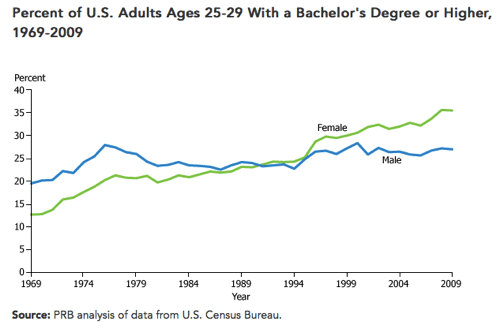The Gender-Norm Challenge: Thinking About Cardiff Garcia’s Thoughts: Friday Focus: March 14, 2014
Cardiff Garcia: Jobs of the future and the gender-norm challenge: “Women hold about 60 per cent of the total jobs in the thirty occupations projected by the US Bureau of Labor Statistics to have the most net job growth in the decade through 2022….
If those trends don’t change, then the recent struggles of men–and especially young men–finding work in a labour market that continues to shift towards traditionally female-dominated occupations will only worsen…. ‘The most female-dominated majors remained that way; the male-dominated majors had continued increases in female representation through the early 2000s…. The same is largely true of occupations…. There is a deep social stigma that attaches to men who are perceived as feminine….’ Cohen’s useful point is that the present course is bad for everyone….
The composition of future jobs is unlikely to get “manlier”…. Can the recent trends change? Will men adapt? It’s impossible to know, and even addressing the question requires thinking about topics that range across the domain of practically all of the social sciences…. Most supportive would simply be a stronger economy and tighter labour markets, which would raise the wages of these low-paid, female-dominated jobs and thus incentivise some men to start taking them, at least on the margin. But to whatever extent gender norms are the problem, then deeply entrenched notions (held by men and women) of masculinity and of the traits that define it may have to change, at least with respect to employment….
New, more enlightened scripts for masculinity and femininity are easy enough to imagine. But their widespread acceptance might require new generations of kids and young adults watching more men do jobs that traditionally are associated with female workers–and then realizing that it’s no big deal. Because it really shouldn’t be…. For the most past, the gender-related stigmas associated with job selection tend to be quite silly….
It’s one thing to wish for these societal changes, quite another to say with confidence that they will happen. Perhaps the necessary process of acculturation simply needs a bit more time. But we honestly don’t know. Ever since the widespread entry of women into the labour force in the 1970s, issues of gender and the workplace have improved in each successive generation. But there are always frictions in the passage from one to the next, and gender-norm resilience is one of them.
It is indeed possible that we are approaching the end of a long transition from a time in which the human skill most valued on the market was the ability to move things with testosterone-boosted muscles to (i) smiling at the customers, (ii) keeping calm, (iii) focusing, and (iv) sitting in a chair; and that our society is not set up to educate young males to focus on smiling at the customers and keeping calm. The extraordinary plasticity of human minds and the wide range of behaviors we see in human cultures would suggest that this should not be that difficult.
But then I look at things like this: from **Kelvin Pollard:** The Gender Gap in College Enrollment and Graduation:

And when I look at this, I suspect that Cardiff Garcia is right, and that things are going to get even rougher for many young first-world males over the next generation or so…</P.
